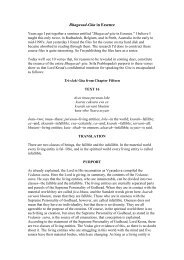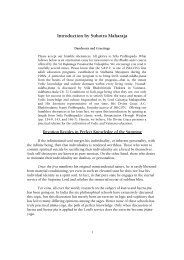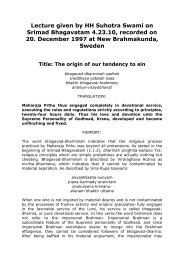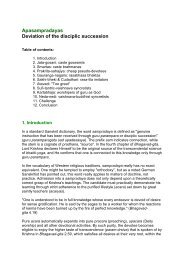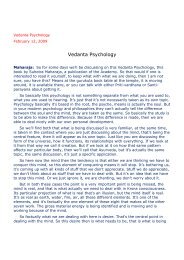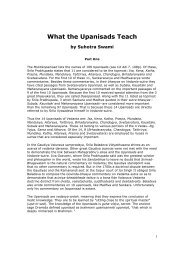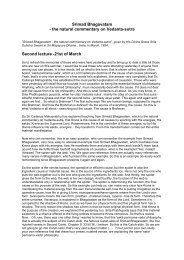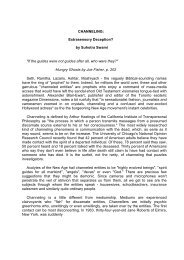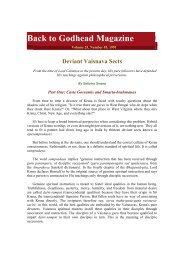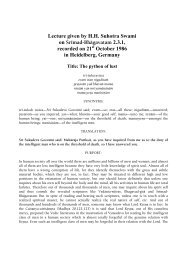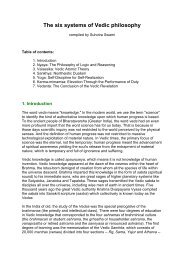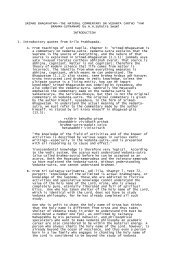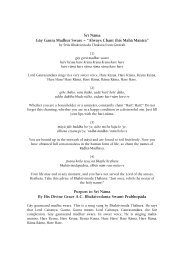don't know. I've sometimes thought that the religionists who go aroundcondemning others to hell and preaching that God is our judge and that we mustfear Him may get that chance. Anyway, the Yamadutas are "just doing their job"for Lord Yama, so how are they blameworthy?TWO QUESTIONSQuestions from Aprameya ddJanuary 18, <strong>1995</strong>Sorry for my toughtless questions. But at least last two questions until I am inPlovdiv (where is my only possibility to use COM) will be about the devotionalservice.1. SB 2.9.23.,p: "One cannot, however, be engaged in the penance of devotionalservice without being completely free from all sins." How to understand thissince I'm not free from all sins and it is said also that the only means for oneto get rid of his sins is the devotional service?2. In your last Vyasa-puja offering -- the wonderful poem – you write: "Inspiritual things there's no exhaution', Prabhupada said... " However, sometimesat the evening when I'm coming back I'm tired. Is that means I'm performing myservice as a material work?Answer by <strong>Suhotra</strong> SwamiJanuary 18, <strong>1995</strong>1. Though one comes to the association of devotees in a sinful state, faith inthe power of sadhu-sangha marks the beginning of one's good fortune. Fromsadhu-sangha comes bhajana-kriya, devotional service under regulation. And frombhajana-kriya, anartha-nivrtti arises. Anartha-nivrtti means the overturning ofsinfulness. Srila Prabhupada said, "Up to anartha-nivrtti, you have to strugglevery hard with determination, then automatically everything will come" --unflinching faith (nistha), taste (ruci), attachment to Krsna (asakti), ecstacy(bhava) and pure love (prema). So all 9 stages constitute devotional service.The stages up through anartha-nivrtti free the devotee from sin. The stagesbeyond that establish him in his eternal position of loving service to Krsna.So when you read about devotional service as the means to get free of sin, thatmeans the beginning stages. And when you read that one must be free of all sinto be really established in devotional service, that means the advanced stages.2. "Srila Visvanatha Cakravarti Thakura comments that although the devotees ofthe Lord become fatigued after repeated diving into the endless waves andundercurrents in the ocean of the Lord's pleasure pastimes, these devotees neverdesire any happiness other than the Lord's service, even the happiness ofliberation. Rather, their fatigue becomes pleasure for them, just as thefatigue produced by sex indulgence is pleasurable for those addicted to sex."(From SB 10.87.21, purport)VAMPIRESQuestion from Labangalatika ddJanuary 21, <strong>1995</strong>In the Bhagavatam we meet many different life forms, but what do the Vedas haveon vampires? Do they exist?
Comment by Vipramukhya SwamiI've met two devotees who have sworn to me that vampires exist, one of whomclaims to have personally seen one. I'll tell the story when I get a chance.Answer by <strong>Suhotra</strong> SwamiJanuary 24, <strong>1995</strong>To my understanding, the creature referred to by the Sanskrit word "vetala" iswhat is known in Europe as a "vampire." Vetalas are mentioned in theBhagavatam, but Srila Prabhupada does not give an English definition of themeaning of the word. In Krsna book Chapter 62, Prabhupada lists vetalas as oneof many kinds of "powerful ghosts and denizens of the inferno."MATERIAL CONCEPTION OF EGOQuestion from Manupriya dasJanuary 25, <strong>1995</strong>In Srimad Bhagavatam 1.9.21 Srila Prabhupada explains about the Lord when Heexhibits Himself as chariot driver of Arjuna. Srila Prabhupada explains in theend of the purport that"The material conception of ego is equibalanced in Him."And he goes on to explain that the Lord does not feel inferior as the chariotdriver.Could you give me a hint how I should understand this explanation. I can notunderstand how material conception of ego can be equibalanced in the Lord.Answer by <strong>Suhotra</strong> SwamiJanuary 25, <strong>1995</strong>Reading over this verse and purport, I conclude that the word "equibalanced"(which also appears in the verse translation, as well as in the sentence youcited from the purport) is linked to the Sanskrit word sama-drsah, which in theword-for-word meanings is translated as "of one who is equally kind to one andall." There is no word in the Sanskrit verse that is directly translated as"equibalanced." Yet it is there in the English verse.The quality of sama-drsah or sama-darsana is explained in the Bhagavad-gita,most notably in 5.18 and 9.29. In the latter verse Krsna says, na me dvesyo'sti na priyah, "I envy no one, and no one is dear to Me." The division ofliving entities into categories of dear and feared takes place on the platformof the false ego. So when the Lord says that He fears no one and holds no onedear, He is saying that this dualistic function of the ego is equibalanced inHim. That is spiritual ego. Therefore the Bhagavatam verse we are discussingsays Krsna is anahankrteh, "free from all material identity of false ego." Thereis a spiritual ego, just like there is a spiritual intellect and spiritual mind.And the difference between them and the material ego, intellect and mind is seenin the way they function. After all, these three are aspects of consciousness,and consciousness is the same "stuff" whether it is in the spiritual world ormaterial world. That which we know as material consciousness is ego, intellectand mind functioning differently from spiritual consciousness. And because ofthat different function, the original and pure ego, mind and intellect becomecovered by the modes of nature. How this happens is described in SB Canto 3Chapter 26, beginning with verse 21. In the Vasudeva- sattva state of puregoodness, consciousness is called citta. In the purport to verse 21, Srila
- Page 1 and 2: DANDA1995Questions and AnswerswithH
- Page 3 and 4: I have already replied to the argum
- Page 5 and 6: Similarly, in an ISKCON temple, a d
- Page 7 and 8: even be well-intentioned (let the c
- Page 9: Answer by Suhotra SwamiJanuary 15,
- Page 13 and 14: i.e. his visible form).to.In the pr
- Page 15 and 16: 1. The self-realization stage just
- Page 17 and 18: ksatriya families worshiped Radha-K
- Page 19 and 20: are banished from Kailasa by being
- Page 21 and 22: always in competition with each oth
- Page 23 and 24: Was that enough, Bhakta Jan? No? OK
- Page 25 and 26: prakampanaloka-gurusrastaparasmai t
- Page 27 and 28: That's they quoted from me.In the c
- Page 29 and 30: to tell how he was abducted to anot
- Page 31 and 32: to come, and these ten avatars corr
- Page 33 and 34: emember and speak the best that has
- Page 35 and 36: devotees, but I gave them as exampl
- Page 37 and 38: CAITANYA UPANISADQuestion from Mukh
- Page 39 and 40: for that. So that... This is going
- Page 41 and 42: A footnote to the previous text:It
- Page 43 and 44: other planets encircle the polestar
- Page 45 and 46: TIME PERCEPTIONQuestions from Rohit
- Page 47 and 48: Answer by Suhotra SwamiJune 27, 199
- Page 49 and 50: connected to the Lord's body. And B
- Page 51 and 52: - How to understand there was no cr
- Page 53 and 54: SB 6.14.55 p., 1st par.: The subtle
- Page 55 and 56: could not even get that. And they l
- Page 57 and 58: "Krsna is the supreme living being.
- Page 59 and 60: Answer by Suhotra SwamiSeptember 26
- Page 61 and 62:
Answer by Suhotra SwamiOctober 11,
- Page 63 and 64:
Vidyabhusana that argued yet anothe
- Page 65 and 66:
SELF-ENVYQuestions from Vrajendra K
- Page 67 and 68:
I was studying the second canto cha
- Page 69 and 70:
Answer by Suhotra SwamiNovember 11,
- Page 71 and 72:
Answer by Suhotra SwamiNovember 11,
- Page 73 and 74:
ATHEISMQuestion from Jahnu dasNovem
- Page 75 and 76:
two years old and under, in accorda
- Page 77 and 78:
that sense one would think the exte
- Page 79 and 80:
1) Yes, the message of Jesus is uni
- Page 81 and 82:
Paul rationalized that Jesus surviv
- Page 83 and 84:
The publication I am working on in
- Page 85 and 86:
- From the context of the second qu
- Page 87 and 88:
Dear Maharaja,I see that it is a qu
- Page 89:
associates, etc. Lord Vamana has Hi



